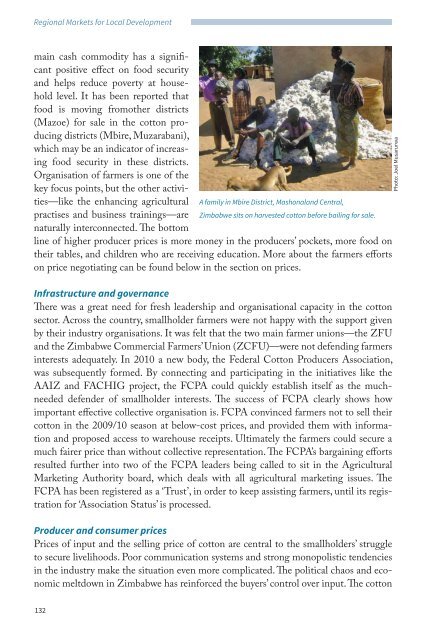Regional Markets
56ec00c44c641_local-markets-book_complete_LR
56ec00c44c641_local-markets-book_complete_LR
You also want an ePaper? Increase the reach of your titles
YUMPU automatically turns print PDFs into web optimized ePapers that Google loves.
<strong>Regional</strong> <strong>Markets</strong> for Local Development<br />
main cash commodity has a significant<br />
positive effect on food security<br />
and helps reduce poverty at household<br />
level. It has been reported that<br />
food is moving fromother districts<br />
(Mazoe) for sale in the cotton producing<br />
districts (Mbire, Muzarabani),<br />
which may be an indicator of increasing<br />
food security in these districts.<br />
Organisation of farmers is one of the<br />
key focus points, but the other activities—like<br />
the enhancing agricultural A family in Mbire District, Mashonaland Central,<br />
practises and business trainings—are Zimbabwe sits on harvested cotton before bailing for sale.<br />
naturally interconnected. The bottom<br />
line of higher producer prices is more money in the producers’ pockets, more food on<br />
their tables, and children who are receiving education. More about the farmers efforts<br />
on price negotiating can be found below in the section on prices.<br />
Infrastructure and governance<br />
There was a great need for fresh leadership and organisational capacity in the cotton<br />
sector. Across the country, smallholder farmers were not happy with the support given<br />
by their industry organisations. It was felt that the two main farmer unions—the ZFU<br />
and the Zimbabwe Commercial Farmers’ Union (ZCFU)—were not defending farmers<br />
interests adequately. In 2010 a new body, the Federal Cotton Producers Association,<br />
was subsequently formed. By connecting and participating in the initiatives like the<br />
AAIZ and FACHIG project, the FCPA could quickly establish itself as the muchneeded<br />
defender of smallholder interests. The success of FCPA clearly shows how<br />
important effective collective organisation is. FCPA convinced farmers not to sell their<br />
cotton in the 2009/10 season at below-cost prices, and provided them with information<br />
and proposed access to warehouse receipts. Ultimately the farmers could secure a<br />
much fairer price than without collective representation. The FCPA’s bargaining efforts<br />
resulted further into two of the FCPA leaders being called to sit in the Agricultural<br />
Marketing Authority board, which deals with all agricultural marketing issues. The<br />
FCPA has been registered as a ‘Trust’, in order to keep assisting farmers, until its registration<br />
for ‘Association Status’ is processed.<br />
Producer and consumer prices<br />
Prices of input and the selling price of cotton are central to the smallholders’ struggle<br />
to secure livelihoods. Poor communication systems and strong monopolistic tendencies<br />
in the industry make the situation even more complicated. The political chaos and economic<br />
meltdown in Zimbabwe has reinforced the buyers’ control over input. The cotton<br />
Photo: Joel Musarurwa<br />
132


